Common Questions asked about Therapy
-
We are temporarily offering all sessions virtually (online through video) using a secure and encrypted platform called Doxy.me. We offer online counselling to people ages 19 and up throughout the province of British Columbia.
We will resume in-person appointments in Port Coquitlam on March 2024. If you prefer in-person counselling, you might consider beginning therapy sessions online and eventually transition to in-person sessions when it becomes available.
-
It is totally understandable to feel nervous meeting with someone new for the first time. We usually share about our approach and welcome any questions you might have. The first session, also known as the intake session, looks a little bit different than the rest of our sessions as it is more structured. We have a set of questions that we ask to get to know you better.
We will ask about your current difficulties, family history, significant life events and therapy goals. This is an important part of the therapy process; this builds upon the foundation of the therapeutic relationship. This allows us to get a big picture of where you’re coming from and what you hope to get out of the therapy process. You get to share what you feel comfortable sharing and will not be expected to share details of traumatic experiences.
-
This is impacted by various factors unique to each person such as (but not limited to) your finances, context and amount of support needed.
To start out, it is typical and recommended that both you and the therapist meet regularly (bi-weekly or weekly) for consistency and to build trust, strengthen the therapeutic relationship, create safety and build a momentum for moving towards what you would like to get out of therapy.
If sessions are scheduled too far apart, a bigger portion of each session might be spent on catching up. As such, you might consider meeting with your therapist more regularly at the start and eventually transition to fewer sessions when you experience shifts and progress in relation to your goals.
-
As therapy is a process, change and progress usually happen incrementally over a period of time. This process is unique to each person. The number of sessions could be impacted by various factors such as (but not limited to) your unique context, amount of support needed, complexity of the things you are processing, and therapy goals. It is common for people to resume counselling at different seasons in their life when different things come up and they need to work on something else. You know yourself best and will likely know when you no longer need therapy and when you might need to resume therapy.
To get the most out of therapy, we invite you to actively participate in the process by investing in yourself outside of therapy. Depending on what resonates with you, this could look like integrating new learnings, taking time to look into resources shared by your therapist and reflecting on session take-aways.
-
This looks different session to session for each individual as therapy is individualized to each person’s needs, readiness and goals. Central to counselling is the relationship and connection with your therapist - this itself is a catalyst for healing. At times we will have conversations and at times we will slow things down to notice thoughts, emotions and body sensations that show up in the present. If relevant, we will invite you to try new things such as mindfulness, grounding and visualization exercises. We usually ask questions that create room for increased awareness, insight and understanding about your past and present.
At the start of each session, we will check-in with you about how things have been going, and whether anything has shifted. We will either pick up from where we left off from the previous session or process anything new that came up. We will review therapy goals every now and then and get feedback about how you are experiencing our time together. At the end of each session, we sometimes suggest things you can try outside of sessions.
-
A common misconception is that counsellors give advice (i.e. you should do this or that)- contrary to this, therapists use invitational language and may sometimes provide suggestions and guide you in exploring possibilities. This could look like your therapist asking you, “I wonder what would it be like for you to consider…? Or, “I am curious about …?
We provide psychoeducation (e.g. knowledge about psychology, grief and trauma, coping tools, actionable steps you might consider, exercises you can try, and resources that might be relevant).
We desire to empower you to make your own choices and will not tell you what to do. You get to make your own decisions. You are the expert of your life and our role is to gently guide you to find the answers, to take small steps and take committed action to move towards living a life in alignment with your core values.

